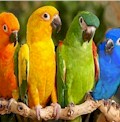The old adage "you are what you eat" applies to Cockatiels too. Feeding a healthy diet is one of the most important aspects of responsible ownership.
The diet often depends on test results that show levels of nutrients in the blood, physical activity, and even previous diet if your bird is older and had previous owners.
There is a variety of thought about the best diet, but here are 5 components on which most seem to agree.
Fresh Water - Provide fresh water and change as often as needed to prevent growth of any unwanted and potentially harmful bacteria or mold. If you live in an older home where water is often supplied through lead pipes.
Be sure to let the wanted run until water that has been sitting in the pipes is flushed out completely before filling your bird's dish or bottle. If you are away frequently, you may want to consider having your bird drink from a bottle-still changing it several times each day.
Pellet Diet - Manufactured by using a combination of seeds, grains and as many 40 concentrated nutrients (including vitamins and minerals) necessary for good health in your Cockatiel, this is a convenient and less time consuming way to insure that your pet is getting all that it needs to meet daily nutritional requirements.
Even though many bird owners suspect high protein as the culprit for kidney disease, scientific studies have yet to confirm this line of thinking. Pellet manufacturers have been sensitive to this concern and many have greatly reduced the amount of protein found in their product.
People Food - Your bird's diet should be supplemented with dark greens such as collards, kale, spinach, and broccoli because they are rich in iron. The orange-colored vegetables such as yams, sweet potatoes, carrots, peppers are recommended for carotene.
Fruits such as bananas, strawberries, seedless grapes, kiwi, pomegranate seeds, and peaches and plums minus the pit provide additional nutrients, visual as well as physical variation in texture, and because they just plain taste good. By the way, this is a great diet for people too.
Vitamins - When feeding a pellet diet, vitamins are not as necessary because the pellets contain all of the necessary nutrients except calcium which can be gotten from the use of cuttlebone.
Over use of vitamins can cause toxicity, so use of vitamins is a subject that should be discussed with the vet since your bird's needs will change as it grows and develops.
Cuttlebone - A great source of calcium, this should be a staple in your bird's cage. Its grainy texture allows your bird to self-trim its beak, and is a great source of calcium that might otherwise go missing from their diet.
If they are reluctant to use it, have patience and try moving it to different locations in the cage to spark use through their curiosity.
